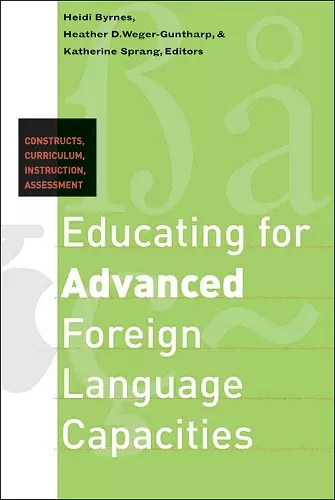Educating for Advanced Foreign Language Capacities
Constructs, Curriculum, Instruction, Assessment
Heidi Byrnes editor Heather D Weger editor Katherine A Sprang editor
Format:Paperback
Publisher:Georgetown University Press
Published:6th Oct '06
Currently unavailable, our supplier has not provided us a restock date

This is easily one of the most important collections of research on L2 proficiency to appear in a long time. It will not only impact how the field defines proficiency at any level; but because it brings meaning to center stage in a far more systematic way than has been the case to date, it sows the seeds for SLA researchers in the future to rethink what the acquisition of languages beyond the first is all about. -- James P. Lantolf, George and Jane Greer Professor in Language Acquisition & Applied Linguistics, The Pennsylvania State University The move to include advanced-level L2 learning and teaching in the study of SLA is not so much one of simple addition as it is one that requires a conceptual shift. The chapters in this timely volume reduce the 'risk of [our] creating false certainties' and push us to rethink fundamental constructs in our field in pursuit of educating for advanced foreign language capacities. -- Diane Larsen-Freeman, professor of education and of linguistics and director, English Language Institute, University of Michigan
Presents both general and theoretical insights and language-specific considerations in college classrooms spanning a range of languages, from the commonly taught languages of English, French, and German to the less commonly taught Farsi, Korean, Norwegian, and Russian. This title highlights a cognitive-semantic approach.Advanced language learning has only recently begun to capture the interest and attention of applied linguists and professionals in language education in the United States. In this breakthrough volume, experts in the field lay the groundwork for approaching the increasingly important role of advanced language learning in the larger context of multilingual societies, globalization, and security. This volume presents both general and theoretical insights and language-specific considerations in college classrooms spanning a range of languages, from the commonly taught languages of English, French, and German to the less commonly taught Farsi, Korean, Norwegian, and Russian. Among theoretical frameworks likely to be conducive to imagining and fostering instructed "advancedness" in a second language, this volume highlights a cognitive-semantic approach. The theoretical and data-based findings make clear that advanced learners in particular are characterized by the capacity to make situated choices from across the entire language system, from vocabulary and grammar to discourse features, which suggests the need for a text-oriented, meaning-driven approach to language teaching, learning, and research. This volume also considers whether and how information structuring in second-language composition reveals first-language preferences of grammaticized concepts. Other topics include curricular and instructional approaches to narrativity, vocabulary expansion, the demands on instructed programs for efficiency and effectiveness in order to assure advanced levels, and learners' ability to function in professional contexts with their diverse oral and written genre requirements. Finally, the volume probes the role and nature of assessment as a measurement tool for both researching and assessing advanced language learning and as an essential component of improving programs.
This welcome volume should be required reading for every language educator at the college level, particularly those involved in curricular decision making at the advanced level. Modern Language Journal
ISBN: 9781589011182
Dimensions: unknown
Weight: 363g
218 pages